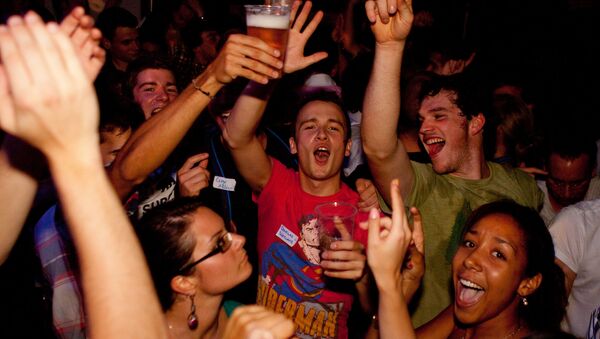But by doing just that, "drunkorexia" binge drinkers are allowing the ethanol in alcoholic drinks to reach the blood system at a much faster rate than normal. This can make the drinker more vulnerable to brain damage, as well as reducing the body's ability to retain minerals and nutrients from the food they do eat.
The latest Health Report by Beneden, a UK health group, surveyed 4,000 people, and found that an intense pressure to be slim, and peer pressure to drink heavily, was pushing Brits to swap food for booze.
@pseudelight WTF is drunkorexia?
— Sarah (@afeites) August 8, 2016
The findings reveal that more young men than women are resorting to "drunkorexia," a slang-term mixing drunk and anorexia. The self-imposed starvation is used as a tool to compensate for planned binge drinking.
The bad news for women, is that as their bodies metabolize alcohol slower than men, so women are more at risk of both short-term and long-term consequences. These could include alcohol poisoning and passing out, to cognitive problems, with difficulty concentrating and making decisions,.
Researchers warn that the so-called "drunkorexia" trend can also lead to even more serious eating disorders or alcohol abuse problems.
Oh come on, '#DRUNKOREXIA' is not a 'thing'. Adding 'orexia' to the end of things just reinforces stigma around serious #mentalhealth issues
— Sarah Robertson (@sarah_robbo) August 10, 2016
Dr. John Giles, Medical Director at Benenden, said:
"Even with the spending of many millions of pounds by the NHS and public health organizations it seems that basic information about diet and wellbeing is not getting through to the public."
Scary report from UK — we should spend more on promoting healthy #diet instead of subsitizing #organic ag @EurActiv https://t.co/t4d76T6NWN
— Lukasz Wozniacki (@WozniackiLukasz) August 16, 2016
"Many young people are seemingly favoring alcohol consumption over a healthy, balanced diet."
The majority of both genders surveyed admitted that they choose the food they do eat motivated purely by wanting to look good, without any concern for their overall health.
However, even when making a vanity-based decision, the report found that the public is in denial about how much they think they know about basic nutrition, despite claiming to be near-experts.
Amazingly, 10% of Brits even thought that a Curly Wurly chocolate bar is healthier than a banana, simply based on the fact that bananas have a slightly higher sugar content (14g vs 13g).
The researchers blame mixed messages on sugar from the media and food company marketing.
Lucy-Ann Prideaux, a Registered Nutritionist who contributed to the report, said:
"Fruit is so much more than just sugar. For starters it's always wrapped up in healthy fibre — which many people sorely lack. A medium-sized banana, for example, contains a wealth of other vitamins and minerals such as 10% of your daily RI for potassium, 20% of your vitamin B-6, 14% of your vitamin C, and 6% of your daily magnesium. None of these vitamins and minerals are present in a Curly Wurly, instead it is packed with emulsifiers, refined sugars and unnatural flavorings."
Overall, Brits are drinking less alcohol than they used to. However, the social habit of bingeing is still more common in the UK than in many other European countries.
Nice to see the UK tackling tackling that binge drinking issue head on. #Portsmouth #holidayinn pic.twitter.com/HJEflMHso8
— Peter Rusch (@Peter_Rusch) July 25, 2016
Beneden, the health group who compiled the report, are calling on Brits, who are watching their weight, to cut back on alcohol rather than food. Alcohol is full of empty calories, which have no nutritional value.




